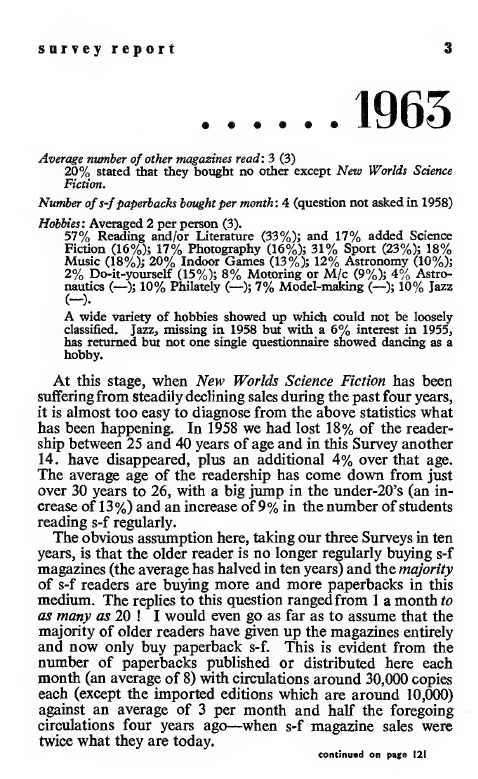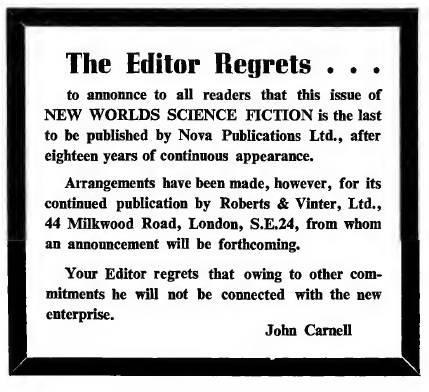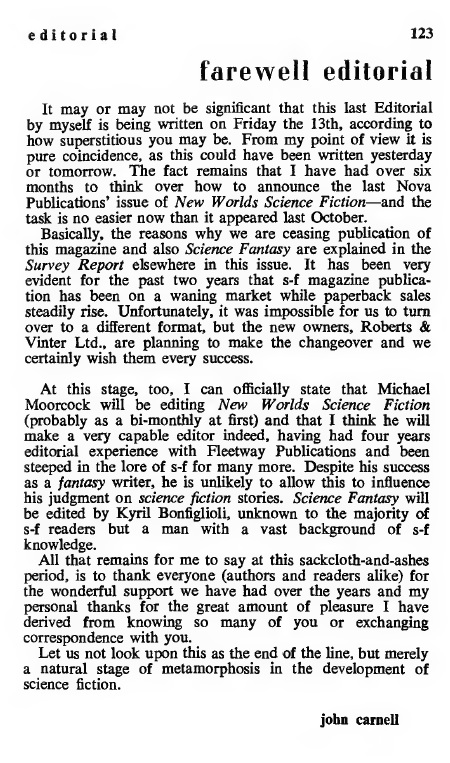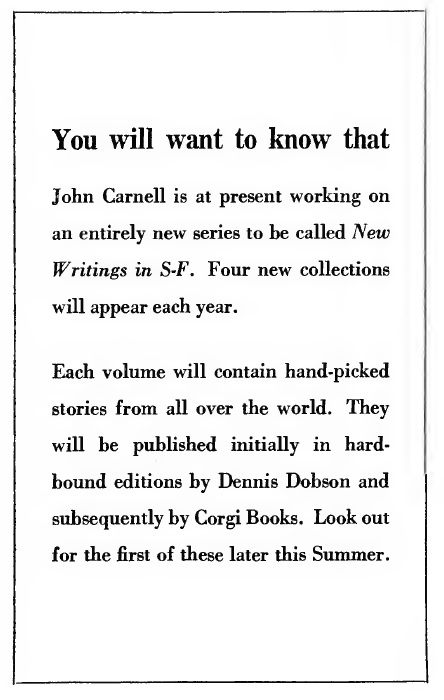
by Mark Yon
Scenes from England
Hello again!
Well, here we are, with what at one time would have been the last ever issue of New Worlds. Since this was announced in November last year, I have flip-flopped between resignation and despair.

With the time arrived, I must admit that I was curious to see what the final issue would be like. Would it go the way of many others before it, in that typically understated British manner, with a polite “Thank You” and a cheery wave? Or would it rage against the unfairness of it all, snarling and roaring like a wounded animal, determined to show everyone in a dazzling blaze of glory that the decision to cancel was wrong?
Interestingly, last month’s issue had given a few hints that it was going to be more of the latter than the former. Editor Mr. John Carnell had accused the genre of being dull, of producing little that was memorable, and yet in the same issue given the rallying call of The Terminal Beach, an undeniably memorable yet undefinable piece of what now seems to be called “New Wave” science fiction. As a result, I wasn’t sure how this one would go. (And as it turns out, there is a lifeline, of which I will explain more later.)
The issue at hand

To begin with, we have Mr. Carnell’s full description of the state of the genre at the end of 1963, as hinted at last month.
It shows some interesting results, if a poll of about 350 correspondents tells us anything. Sf readership is getting older, presumably as readers stay with the genre, but there is an intriguing development with an increase in younger readers – much needed, perhaps, and also reflecting the sea change in the genre. Perhaps most importantly, with the improved accessibility of paperbacks it is perhaps no surprise that magazine sales are down and book sales are up. The summary ends on a positive note, that sf is now perhaps more mainstream than ever before – but it does make me wonder what those who like their sf to be off-kilter and underground think about it.
To the stories themselves.
beyond the reach of storms, by Mr. Donald Malcolm
We begin the stories in this issue with the last in Mr. Malcolm’s Planetary Expedition Team (P.E.T.) stories. The most recent was in the March 1964 issue. In the tradition of many old-style s-f stories, it starts with an unusual astronomical discovery – that of a star with a hole in the middle! Of course, our team have to travel through it. I’m not sure about the scientific plausibility of such a thing, but the novelette is pretty traditional s-f – entertaining yet nothing particularly startling. I have grown to like these stories, but they are not especially memorable. 3 out of 5.
megapolitan underground , by Mr. William Spencer
And this is this month’s attempt to be Ballard. After Mr Spencer’s tale of automotive madness last month, this is another story about urban angst, this time created by travelling on moving walkways and being bombarded with advertising images. It made me think of a never-ending journey on the London Underground, although it is really an alternative take on Mr. Robert Heinlein’s The Roads Must Roll. Again, it’s not something particularly new, nor particularly original. It seems that we have had a few of Mr. Spencer’s stories from the left-over pile. 3 out of 5.
now is the time , by Mr. Steve Hall
As computers in the future may become part of everyday life, here we have a story of another potential use: the manipulation of a political election by computers. The premise seems a little far-fetched to me – who would have thought such things were possible? In any event, the story does little more than illustrate the idea. 3 out of 5.
Farewell, Dear Brother, by Mr. P.F. Woods
As the last ever short story of New Worlds (at least, so we had been led to believe until this month), I’m pretty sure that this story by Mr. Woods (also known as Mr. Barrington J. Bayley) has been deliberately placed here in the magazine because of its title. It is a story of the broken relationship between a twin and his feckless brother, the more reckless of whom has been in a space accident and is now kept at home in the attic, out of the way of visitors. It’s meant to be creepy and despite the dodgy science (a planet with no temperature?) is quite readable in its portrayal of a dysfunctional family. But is it really sf? 3 out of 5.
open prison , by Mr. James White
And now the last installment of the final(?) serial in New Worlds. Following on from last month, we’re back to our story of civilians and military personnel trying to escape from a planet they’ve been imprisoned upon. Usually in such a story, the last part of this three-part escape story is meant to be the exciting bit, where our heroes and heroines leave the prison planet despite all the odds and return to normality. The problem is that it ends without too many surprises. With three weeks to go before E-Day there’s tension between the military group and the civilians, not to mention between the men and the women, but in the end, guess what happens?
This feels like a bit of a damp squib to finish a rather disappointing tale. There’s nothing particularly wrong with it, except perhaps for that whiff of male-chauvinism that pervades the pages occasionally and that I felt more sorry for the alien Bugs killed than the humans trying to escape. But it’s a frustratingly mundane tale with a weak ending that is not up to the standard of Mr. White’s Sector General stories, which I enjoyed much more. In short, I pretty much worked this one out from the start, and barely got what I expected. 3 out of 5.

At the back of this issue we have the tying up of loose ends. There’s a Farewell Editorial, which gives us the news that although Mr. Carnell is moving onto pastures new, we will see the return of New Worlds and Science Fantasy, but under new editorship. For New Worlds, Mr. Michael Moorcock is to take the reins in a new incarnation of the magazine, which I think should be interesting and different.

There’s another short set of Book Reviews by Mr. Leslie Flood. This is one part of the magazine I will miss most, as Mr. Flood’s brief yet insightful comments have led me to try many books I might have missed otherwise over the years. This time he looks at Mr. Robert Sheckley’s ‘mordantly successful’ Journey Beyond Tomorrow, Mr. Robert P. Mills’s “superlative collection” The Best of Fantasy & Science Fiction 11th Series (really?) and two new books in a new series, which confirm what we have said earlier this issue, that the future of sf may be in book form rather than in magazines. Even when one of them is Mr. E.C. Tubb’s Window On the Moon, which ironically was serialised in New Worlds last year.
Lastly, we have a final Postmortem letters page, which reflects the plaudits and dingbats showered upon the magazine in its coverage of sf over the last few years. It is noticeable that one of the letters is from new editor, Mr. Michael Moorcock, and another from Mr. Moorcock’s artist friend, Mr. Jim Cawthorn, gestures which bode well for the future, perhaps.

Summing up
This last issue of New Worlds in its present incarnation is sadly not what I hoped it would be. It’s an issue which feels tired and rather beaten. There’s nothing particularly wrong with it, yet it is not as memorable as last month’s issue. Whether this is because of money, because of a lack of interest or just that Mr. Carnell has run out of steam, I do feel that the magazine is leaving not with a bang but with a whimper. It is just not as good as some of the issues that preceded it, although it reflects the transition taking place in some quarters of the British genre scene.
Which then leads me to consider where we are in Britain with sf in 1964. As the Survey at the beginning of this issue shows, the reading habits and even the readership of sf are changing. We are in a very different place from where we were a decade ago, and whether we like it or not, much of this change is as a result of the work of Mr. John Carnell here at New Worlds. I think that it’ll be interesting to see where this goes with new leadership, although at the same time I suspect that not everyone is going to like it.
What I don’t know at this stage is when the new New Worlds will appear. Settling into a new form may take time, although it seems Mr. Moorcock has had a couple of months to get things together. I did notice that the magazine didn’t say anything about an issue next month, so nothing is definite about when I actually get the next one. If and when a new issue does appear, you'll be hearing from me about it here on the Journey, so watch this space!
[Come join us at Portal 55, Galactic Journey's real-time lounge! Talk about your favorite SFF, chat with the Traveler and co., relax, sit a spell…]



I must confess, I thought Spencer's story was the highlight of the collection. I found the pairing of the scenes from the screens the narrator was viewing and getting "sucked" into with his own paranoid ideas — and eventual breakdown — rather ingenious. It deserved a reprint.
Note: I was just as critical as you, if not more, of the remaining stories — although I did not review Open Prison.
Link to my review: https://sciencefictionruminations.com/2019/03/23/short-story-reviews-four-stories-from-new-worlds-science-fiction-april-1964-ed-john-carnell/
Hello, Joachim! It's a fair point on the Spencer.
I may have been harsh because it trod similar ground to his story last month, and in comparison the Ballard story last month (which also follows similar ideas) knocks these out of the park, so to speak. (I'm still trying to work it out…)
But if I was looking at the story in isolation, rather than as an ongoing concern, it might have scored higher. (You might have noticed though that I am quite critical!)
"Beyond the Reach of Storms" — Spent a lot of time setting up the puzzle, when it could have been done in a much shorter fashion. The exploration of the mystery was more interesting, but then the story ends with an anticlimax that was little more than a joke.
"Megapolitan Underground" — I liked this one quite a bit. It may not be quite as good as similar work by Ballard, but it worked well enough on its own for me.
"Now is the Time" — Pretty simple and obvious. Probably more effective for a British reader who has familiarity with the Parliamentary system.
"Farewell, Dear Brother" — A decent idea, but telegraphed from the beginning, and too long for the basic premise.